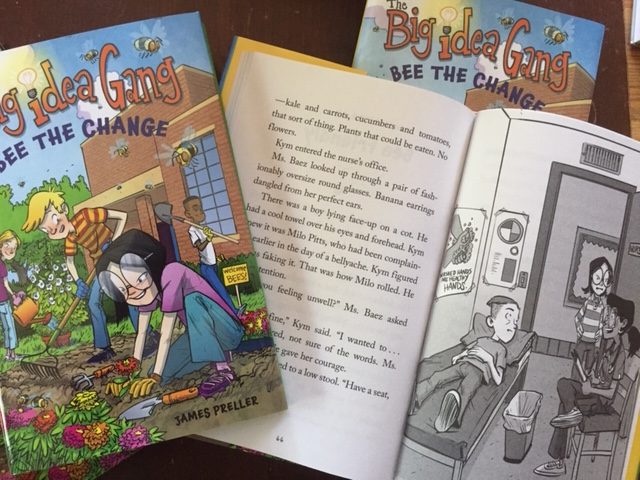—
–
“The book sailed through the air,
as if its pages were wings,
and landed in the box marked TRASH.”
— from Everybody Needs a Buddy.
–
Over the years, I’ve been entertained by different blog sites that feature hilariously outdated books still found in libraries. This scene from Everybody Needs a Buddy, the second book in the upcoming “Big Idea Gang” series, revolves around the zippy new librarian at school, Ms. Ronson. The kids are working on their project, hoping to persuade the school to install a “buddy bench” in the playground, when this encounter takes place.
But first, a brief description from an earlier page:
Ms. Ronson didn’t look much older than most middle schoolers. Small and thin, she wore her hair short and dyed bright red at the tips. Ms. Ronson was young and energetic. She wore colorful scarves and six earrings in each ear. She even had tattoos. And, of course, the kids loved her immediately — mostly because of her lively personality.
And later:
“Excuse me, Lizzy? Padma?” a voice called. It was Ms. Ronson, now on her hands and knees by a back bookshelf. “Could you please bring over those boxes? Thanks ever so much.”
 Ms. Ronson dumped some of the books in the first box. “Good riddance,” she muttered.
Ms. Ronson dumped some of the books in the first box. “Good riddance,” she muttered.
Lizzy was alarmed. “What are you doing? You can’t throw away books! It’s a waste of money.”
“Oh, Lizzy,” Ms. Ronson said, “some of these books have been here forever. No one reads them. They are taking up valuable space. Look at this book.” The young librarian held up an old science book. The cover read FUN WITH COMPUTERS! “This book is twenty years old. It’s terribly out of date. It’s useless, Lizzy, and it’s got to go.”
Lizzy could see that Ms. Ronson was right.
“Here’s another,” Ms. Ronson said, her voice rising. The cover read CAREERS FOR WOMEN. Ms. Ronson flipped through the stale, yellowed pages. “Look at these jobs. Secretary, flight attendant, piano teacher, bank teller!” Ms. Ronson actually growled, grrrrr. “Where’s scientist? Or financial analyst? Or astronaut? Or how about president? Maybe that’s what our country needs — a woman in the White House!”
The book sailed through the air, as if its pages were wings, and landed in the box marked TRASH.
Ms. Ronson laughed. “I’m sorry, it just makes me crazy.” She swept an arm across the room. “Our graphic novel section is much too small. I can’t keep enough scary books on the shelves, because they are so popular. I don’t have any of this year’s new award-winners. Libraries have to change with the times. This is why it’s so wonderful that the PTA has decided to donate money for books. Don’t you agree?”
Lizzy and Padma nodded. Yes, they sure did. Lizzy tugged on Padma’s arm. “Come with me,” she whispered. “I want you to talk with the rest of the gang. I think I’ve got an idea — but we’ll need your help.”
–

Illustrations by Stephen Gilpin. Coming: January 2019, 96 pages, grades 1-4, Houghton Mifflin Harcourt. Also look for Worst Mascot Ever from the same “Big Idea Gang” series.
–
–











 A recent edition of the Oxford Junior Dictionary swapped nature words for modern terms. Out went acorn, wren, dandelion, nectar, and otter. In went blog, bullet-point, attachment, chatroom, and voicemail. Updating dictionaries isn’t new. And maybe cygnet isn’t as relevant as database, but it’s certainly more musical. If we treat language like paper towels, it’s no wonder many kids can’t name common backyard birds.
A recent edition of the Oxford Junior Dictionary swapped nature words for modern terms. Out went acorn, wren, dandelion, nectar, and otter. In went blog, bullet-point, attachment, chatroom, and voicemail. Updating dictionaries isn’t new. And maybe cygnet isn’t as relevant as database, but it’s certainly more musical. If we treat language like paper towels, it’s no wonder many kids can’t name common backyard birds.





